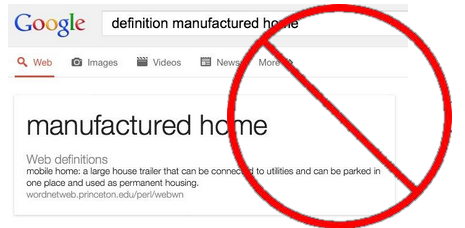As a reminder to regular readers, or to set the stage for a first time visitor here, it came to our attention that Princeton’s WordNet project had a high organic search result on Google and a simply horrible ‘definition’ for manufactured housing.
When we brought this to the attention of some industry professionals, they started writing Princeton’s WordNet to ask them to make an appropriate correction! Here are some more replies, published with the permission of the person who sent them. We encourage manufactured housing professionals and home owners to write WordNet too, see their email address below.
—–
wordnet@princeton.edu
Please accept my expertise as a 41 year industry veteran & former Sales Manager of 2 mobile/manufactured housing factories in the 70’s and the OWNER of over 17 Retail dealerships the last 31 years. Also, as a consumer of factory-built homes during college and after entering the industry.
1. Trailer: A flatbed, or RV, for hauling or recreational use. Also, the towable part of an ’18 wheeler’.
2. Trailer house: Popularized in 1953 by the Lucille Ball & Desi Arnez in the movie “The Long, Long Trailer,” which was an oversized travel trailer they towed behind a car and was only 8 feet wide. Rarely used as a ‘permanent’ dwelling.
3. Mobile Home: Built in a factory prior to the June 15,1976 HUD code. Subject to various state ‘codes,’ such as ANSI, and grew in width & length during the 60’s & 70’s and were never towable behind an automobile or pickup truck. “Mobile Homes” became extremely popular in that time period as an inexpensive housing alternative, with prices running under $2,000 to less than $10,000 in most cases.
4. Manufactured Home: A minimum 400 sq. foot home, or larger, built to the HUD Code for manufactured housing after June 15, 1976 and built in a factory. Designed to be permanent housing with a life span equal to other forms of housing. Can be purchased as personal property, or as an improvement to real property in most cases. Manufactured Homes can be relocated.
5. Modular Home: Built in a factory and transported to site typically on a temporary ‘frame’ and situated on a permanent foundation, and rarely can be re-located. Not built to the HUD Code, but rather to state or local building codes.
6. Factory Built Homes: “Catch all” name for all housing built in a factory, whether an old Mobile Home, new or used Manufactured Home, Modular Home, or pre-fab homes built in pieces at a factory & assembled on site.
As a respected institution of knowledge & learning, it is important you correct the mis-information in your definition as soon as possible to avoid tarnishing your own reputation, as well as ours.
Respectfully,
Frank Woody
Owner Republic Manufactured Housing Corp. & Republic Factory-Built Homes
Weatherford & Early, Texas
—————
A problem with your definition of “manufactured home”
Word Net:
Society is accustom to labels. Most of these stem from archaic stereotypes and perceptions from preceding generations. This is certainly the case with your definition of “manufactured home”. Not your fault. It stems from generations referring to mobile housing in its original form in the 30’s; 1930’s.
Today’s manufactured homes are “trailers” no more. But today, manufactured homes represent the latest technology in home building; leveraging production philosophies to reduce costs and build consistent value in American housing. Windows, doors, trusses, cabinets and so many more components used to be built on site, but are now pre-fabricated in a production environment to assure consistent quality and controlled costs. High value housing has followed suit.
I hope you will consider changing your definition to more accurately reflect the advancement of value driven home building.
Chris Nicely
Manufactured housing industry consultant
Knoxville, TN
——————
Lazy, Lazy
wordnet@princeton.edu
No one who had completed five minutes of research would leave in place the “definition” of manufactured home that your organization has placed. Given the mountains of data that unequivocally demonstrate the extremeness of your error the only explanation is that your organization is so rampant with laziness that no one wants to take the trouble to correct such an obvious error.
Regards,
Doug Gorman
Award Winning Manufactured Home Retailer
Tulsa, OK
——
MHLivingNews,
Recalling the important debate you started about defining “manufactured housing,” here is a very good one from of all places, Utah, which just enrolled this bill as law!
Manufactured home” means a transportable factory built housing unit:
127) constructed on or after June 15, 1976, according to the Federal Home Construction and Safety
128) Standards Act of 1974 (HUD Code), in one or more sections, which, in the traveling mode, is
129) eight body feet or more in width or 40 body feet or more in length, or when erected on site, is
130) 400 or more square feet, and which is built on a permanent chassis and designed to be used as a
131) dwelling with or without a permanent foundation when connected to the required utilities, and
132) includes the plumbing, heating, air-conditioning, and electrical systems.
Attached below is the first few pages of the law for added context. Feel free to spread the word!
Utah State Legislature H.B. 71 US Official News May 11, 2013
Rob Coldren | Senior Partner
HK&C Law
Santa Ana, CA 92707
————
You can find more letters from MH Industry leaders and professionals addressed to Princeton’s WordNet project, linked here.
Please send your own message to Princeton’s WordNet atwordnet@princeton.edu. Thank you! ##
 manufacturedhomelivingnews.com Manufactured Home Living News
manufacturedhomelivingnews.com Manufactured Home Living News
































